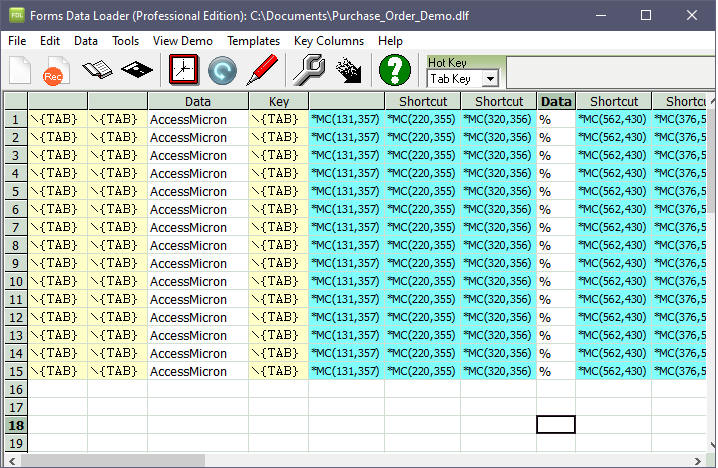Navigating Data Loading in Oracle EBS: From Manual Entry to Streamlined Tools

In the realm of enterprise resource planning (ERP) systems, efficient data loading is paramount for businesses relying on Oracle E-Business Suite (EBS) to manage their operations. From inputting crucial financial information to updating inventory records, the methods employed for data loading can significantly impact the productivity and accuracy of business processes. In this article, we explore three primary methods for data loading in Oracle EBS: manual data entry, utilizing the Data Loader tool, and leveraging the SQL*Loader utility.
Methods for Data Loading in Oracle EBS:
- Manual data entry
- Using Data Loader tool
- SQL*Loader utility
Manual Data Entry:
 Manual
data entry, though initially seeming straightforward, is often fraught
with inefficiencies and errors, particularly when utilized for loading
data into Oracle E-Business Suite (EBS). This method entails human
operators manually inputting data directly into the system's interface,
such as forms or screens. While it may suffice for small-scale data entry
tasks or sporadic updates, manual entry quickly becomes impractical and
error-prone as the volume of data escalates.
Manual
data entry, though initially seeming straightforward, is often fraught
with inefficiencies and errors, particularly when utilized for loading
data into Oracle E-Business Suite (EBS). This method entails human
operators manually inputting data directly into the system's interface,
such as forms or screens. While it may suffice for small-scale data entry
tasks or sporadic updates, manual entry quickly becomes impractical and
error-prone as the volume of data escalates.
Consider a scenario
wherein a retail company aims to update hundreds of product descriptions
and prices within Oracle EBS. The manual entry process necessitates
employees to navigate through the system's interfaces individually,
inputting each update one at a time. This approach not only demands
significant labor but also introduces a considerable margin for human
error, potentially resulting in discrepancies within the data.
The
limitations of manual data entry in Oracle EBS underscore the necessity
for more efficient and reliable alternatives. One such solution is the
integration of automated data loading techniques. Automation streamlines
the data loading process by leveraging software tools to extract data
from external sources, transform it as needed, and load it into Oracle
EBS without human intervention.
Automation offers several
advantages over manual data entry:
- Efficiency:
Automated data loading significantly reduces the time required to input large volumes of data into Oracle EBS. Instead of manual input, which is time-consuming and tedious, automation can process data rapidly and consistently. - Accuracy:
By minimizing human involvement, automated data loading reduces the risk of errors inherent in manual entry. Automation tools can validate data before loading it into the system, ensuring data integrity and reducing the likelihood of discrepancies. - Scalability:
Unlike manual entry, which becomes increasingly impractical as data volume grows, automation can scale to handle large datasets efficiently. Whether updating hundreds or thousands of records, automation maintains performance and reliability. - Cost-effectiveness:
While manual data entry incurs labor costs and potential errors, automation offers a more cost-effective solution over the long term. By streamlining processes and minimizing errors, automation helps organizations save time and resources.
Implementing automated data loading in Oracle EBS typically involves
the use of specialized tools or custom scripts tailored to the
organization's requirements. These tools can extract data from various
sources, such as databases, spreadsheets, or external applications, and
transform it into the format required by Oracle EBS for seamless
integration.
In conclusion, while manual data entry may suffice
for small-scale tasks, it proves inefficient and error-prone when dealing
with large volumes of data in Oracle EBS. By embracing automation,
organizations can streamline the data loading process, enhance accuracy,
and improve overall efficiency within their EBS environment.
Using Data Loader Tool:
To streamline data loading tasks and minimize manual effort, most of the Oracle EBS users relies on the Data Loader tool. This tool allows users to upload data from external sources, such as spreadsheets or CSV files, directly into the system. By mapping the columns in the external file to corresponding fields in Oracle EBS, users can quickly and accurately import bulk data without manual intervention.
Data Loader is designed to import data from
external sources like Excel/CSV into Oracle Applications tables, bringing
in external data and transforming it into a format that Oracle
understands.

Data Loader loads data into Oracle Apps through front-end forms. The Oracle Applications behaves as the data is entered by a users, thus all validations, checks and conditions are met.
The Data Loader uses the good ol' Macro Loading method to load data. So, what's the deal with this macro loading method, you ask? Well, it's basically like this: it mimics keystrokes and mouse clicks to get the data into Oracle forms. Easy peasy!
The Macro Loading method is not 100% reliable. Although it meets the requirement most of the time. And also Oracle is switching many of it applications forms from old Java Applet forms to Web Based forms. And as everybody knows, it is quite difficult to use Macro Loading method for loading data into Web Based forms because of non availability of hot keys. To overcome this challenge and to meet the latest demands from Oracle EBS users, Interface Computers have come up with the latest Data Loader for loading data into Oracle Web Based forms called : HTML Data Loader! This latest tool loads data programmatically and doesn't solely relies on macro loading method to load the data into web based forms. Thus, providing 100% reliable loads. The latest tool supports all the latest browsers like MS Edge, Google Chrome, Firefox and the old classic Internet Explorer.
You can try latest version of Data Loader free of cost by downloading the trial version by clicking the following link:
Download Free Data Loader Tool
For example, suppose a manufacturing company needs to import a large
list of new suppliers into Oracle EBS. Using the Data Loader tool, the
company can prepare a spreadsheet containing supplier details, such as
names, contact information, and payment terms. By configuring the Data
Loader to recognize the appropriate fields in Oracle EBS, the entire list
can be imported in a fraction of the time it would take through manual
entry.
Oracle SQL Loader Utility:
For advanced users well-versed in SQL and adept at navigating database
operations, the SQL Loader utility stands out as a robust alternative for
loading data into Oracle EBS. Offering a seamless integration pathway,
SQL*Loader empowers users to efficiently import data from external files
directly into designated Oracle database tables, sidestepping the
laborious process of manual data entry or reliance on intermediary
interfaces.
Imagine a scenario where a bustling financial institution finds itself
tasked with importing millions of transaction records into Oracle EBS for
reconciliation purposes. Here, SQL Loader emerges as a formidable ally.
Through its versatile capabilities, the institution can meticulously
prepare a structured data file housing transaction details and
meticulously define control files, specifying the precise data format and
mapping specifications to align with Oracle database tables. Leveraging
its adept batch processing capabilities, SQL Loader swiftly orchestrates
the transfer of vast troves of data into Oracle EBS, requiring minimal
human intervention and expediting the entire data loading process.
In essence, the efficacy of data loading in Oracle EBS stands as a cornerstone for preserving the integrity and currency of information vital across diverse business functions. While manual data entry serves as a rudimentary option, organizations poised for operational excellence recognize the transformative potential inherent in tools like the Data Loader and the SQL*Loader utility. Through strategic adoption and adept utilization of these tools, businesses can seamlessly streamline their data loading workflows, mitigate the occurrence of errors, and fully harness the expansive capabilities of Oracle EBS to propel their operational endeavors towards unprecedented efficiency and success.
How to get Oracle SQL Loader.
If you have installed Oracle database software then SQL Loader utility is automatically installed with it.
Otherwise, from Oracle Ver. 12c, this tool is also automatically installed if you install Oracle Instant Client.
Oracle Instant Client has expanded its offerings to include essential
utilities such as SQL*Loader as well as the Export/Import utilities exp
and imp.
Click the following link to Download Oracle Instant Client
https://www.oracle.com/database/technologies/instant-client/downloads.html
Accessing these tools is now simpler than ever. No login or
cumbersome click-through process is required. Users can effortlessly
download, unzip, and configure their system library search path (e.g.,
PATH on Windows or LD_LIBRARY_PATH on Linux).
Previously, these
utilities were exclusively bundled with a 'full' client installation or
within a complete database installation. However, their inclusion in
Instant Client means users can now enjoy the benefits of these tools with
a smaller disk footprint and significantly faster installation process
compared to a full client setup. Moreover, the convenience of the OTN
license further enhances the accessibility of these tools for many users.
With these tools now seamlessly integrated into Instant Client,
loading data from a file on a system without pre-existing Oracle software
is a straightforward task, simplifying data management processes for
users across various environments.
For a tutorial on how to use SQL Loader utility please click the following link
https://www.oracle-dba-online.com/sql_loader.htm
